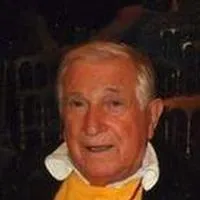Harry Inder was born in Halifax, Nova Scotia in November, 1919. He began his premedical education in 1938 at Canada's prestigious McGill University. However, when war broke out in Europe, Harry left university in December 1939 to join the Royal Canadian Air Force. His training as a pilot began in Canada and was completed in Britain with the Royal Air Force.
Once a full-fledged pilot, Harry was sent with his RAF squadron to North Africa to fight against Rommel's troops. While on a mission, Harry, who thus far had managed to dodge the enemy flack, was directed to lead one of his unluckier comrades who had been hit back to base. His comrade had sustained severe facial wounds, which rendered him almost blind. Harry managed to lead his fellow pilot to safety but in so doing was shot down in the North African desert. His small fighter plane was crippled by the loss of the tail and both wings were destroyed.
Miraculously, Harry survived the crash with only bruises but was captured by the Germans, who transported him to Konigsberg. Germany and then to numerous prisoner of war camps until he reached Poland. In July 1944, the ill-nourished, poorly clad Harry was shuttled around Poland, ending in Swinemunde on the Baltic where he was forced to board a coal ship with his fellow POWs. Once onboard, the POWs were imprisoned and chained in the hold for the duration of the 250-mile journey to Memel in Lithuania. The conditions were overcrowded, filthy and without space for the meager backpacks the POWs had fashioned from their shirts by tying the sleeves at the cuffs. The backpacks had to remain on deck. In February 1945, when the starving and sick POWs arrived in Memel, they picked up their sparse belongings and debarked. While still chained to each other, the POWs began the 750-mile forced march through Lithuania and Poland back to Germany. To keep a brisk pace, soldiers stabbed the POWs indiscriminately with knives. Harry was fortunate: He was not stabbed. However, Harry did not escape the many nights he and his fellow POWs slept without shelter in the frigid winter elements with only thin, ragged clothing and leaky, poorly fitting boots for cover. (The Red Cross had provided boots to the POWs but, not knowing everyone's boot size, the Red Cross workers did the best that they could with what they had.)
At the end of the forced march, Harry and the remaining six to seven hundred emaciated POWs were liberated by the British at Lunaburg in Northern Germany after crossing the Elbe River. Harry was then taken to England for medical treatment and returned to Canada on the Queen Mary.
Harry went back to McGill University to complete his premedical education and in 1947 married the former Hilare South from Montreal. Harry went on to attend McGill Medical School and, following graduation in 1951, he completed his internship and residency in obstetrics and gynecology in Connecticut and New York, whereupon he opened his practice in Bridgeport, Conn.
Harry retired in 1987 and, with Hilare, moved to Houndslake in Aiken to play golf.
Aiken Standard - (Jan/26/2008)
